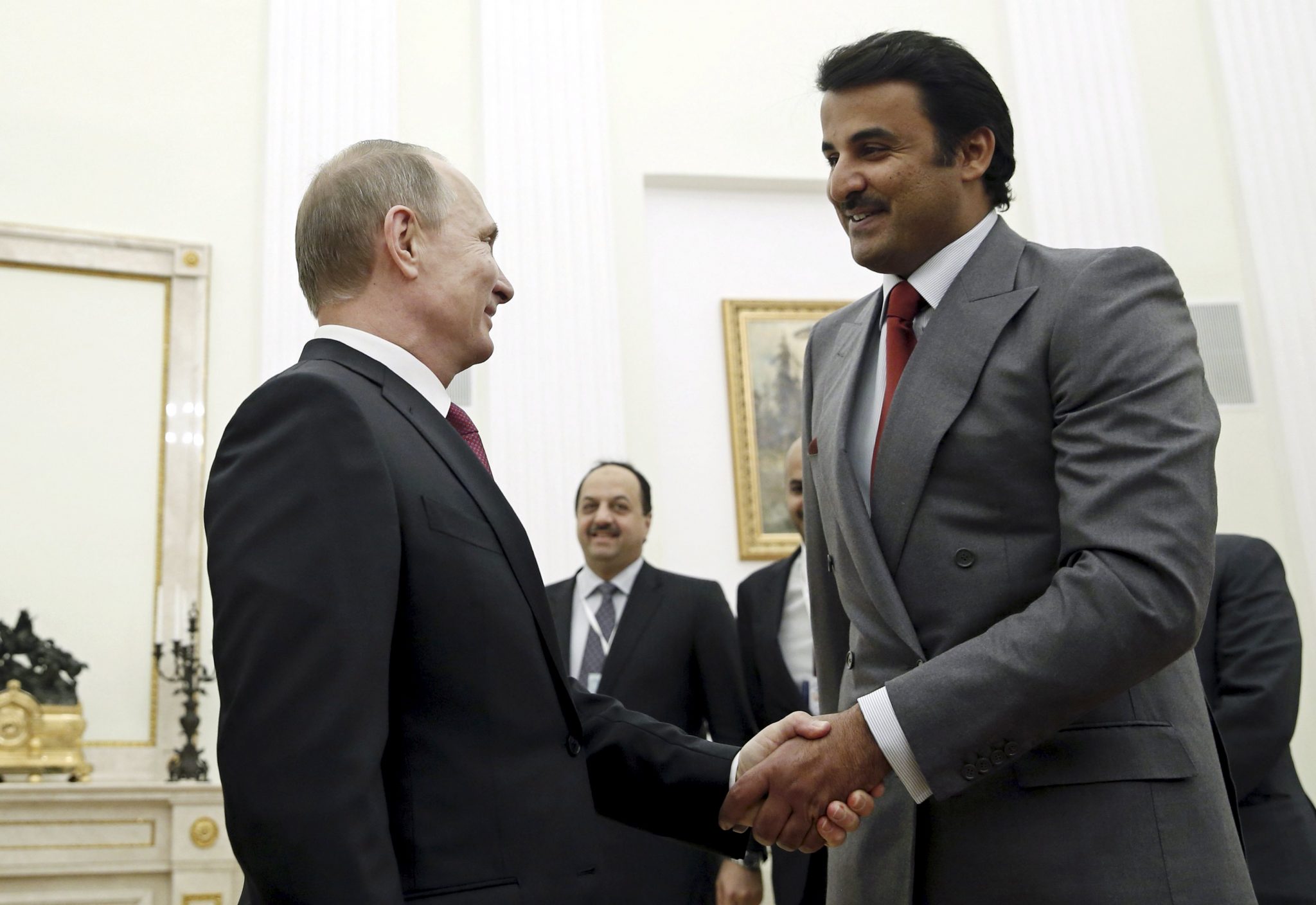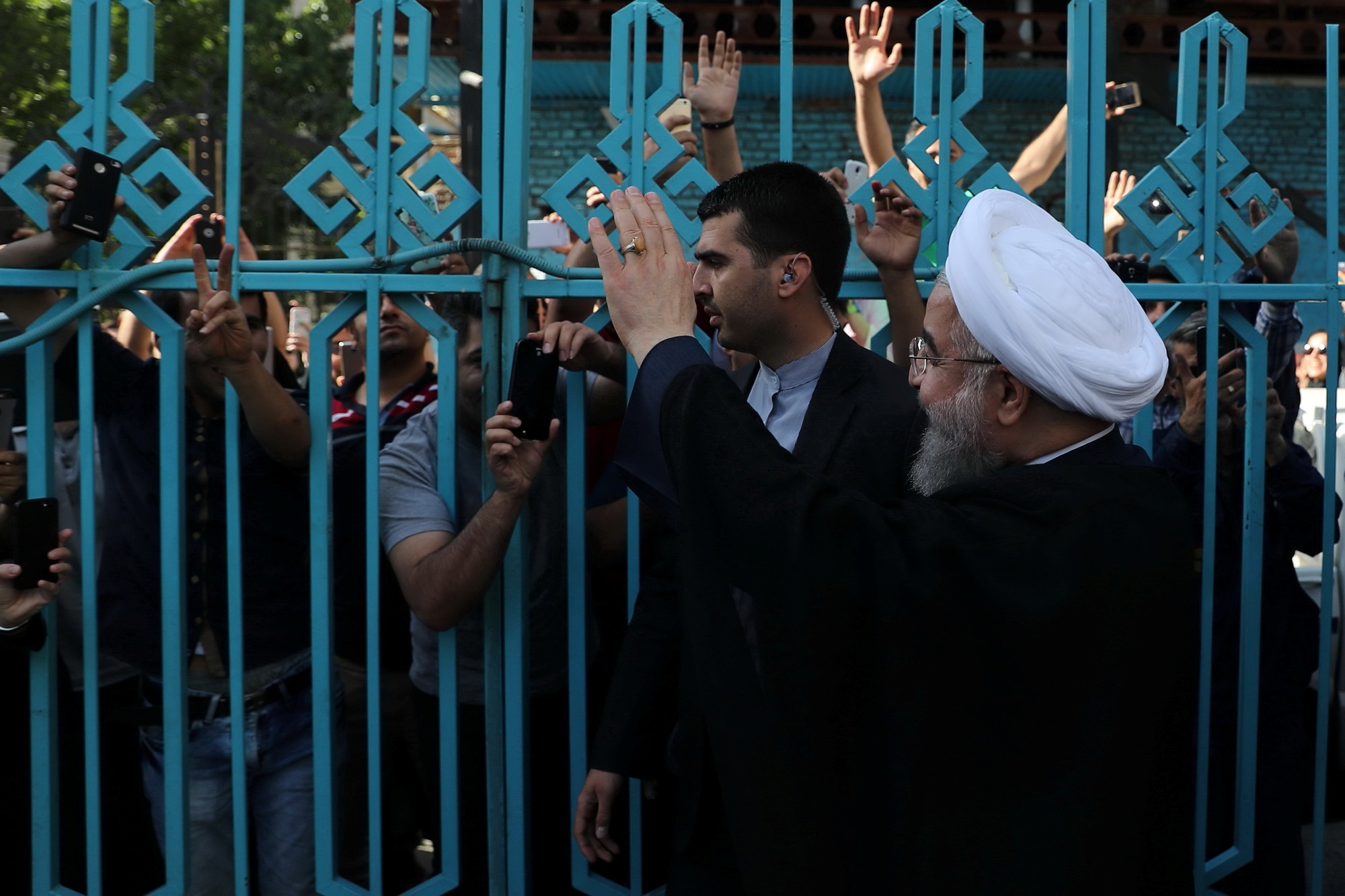
Regardless of the outcome of the Qatar–Gulf states rift, it represents a shot across Qatar’s bow. Therefore, Doha will seek to diversify its partnerships away from its traditional partners, who let Qatar down. In that context, Russia is viewed in Doha as a potential partner. And Moscow eyes Qatar as a money bag with geopolitical value.
Last week, On June 5, 2017, Saudi Arabia, the UAE, Bahrain, and Egypt broke diplomatic ties with Qatar and cut off air, sea, and land routes over Doha’s alleged support for “terrorist groups aiming to destabilize the region.” A few other Arab countries followed suit.
Right from the start of the rift, Moscow was engaged in active phone diplomacy. On June 5, Russian foreign minister Sergey Lavrov and his Qatari counterpart, Mohammad bin Abdulrahman Al-Thani, held a phone conversation to discuss the incident. Almost simultaneously the Russian and Turkish presidents Vladimir Putin and Recep Tayyib Erdoghan also discussed by phone the diplomatic crisis in the Gulf region. The next day Putin and Qatar’s emir, Tamim Bin Hamad Al-Thani, talked over the phone regarding the incident. Finally, the Qatari foreign minister visited Moscow on June 10 to discuss the Gulf crisis with his Russian counterpart, Sergey Lavrov.
In the meantime, media reports alleged that Russian hackers may have been behind the May 23 hacking of the Qatari news agency. Russian officials angrily rejected the allegations. Just a few days earlier, though, President Putin had suggested that some Russian hackers might be acting independently, saying, “Hackers are free people, just like artists.” The fake news reports posted on the hacked website are believed to have contributed to the opening of the Qatar-Gulf rift. Doha, however, has refrained from commenting on the allegations that Russians were involved in the hacking.
There is some speculation about regime change in Qatar in the media. Donald Trump made controversial statements regarding the rift in the Gulf region, where the U.S. has a heavy military presence, including around 10,000 servicemen in Qatar alone. The Turkish parliament and president have approved legislation to deploy a military contingent in the country according to an agreement with Qatar. The aim of the deployment is to diversify Qatar’s security guarantees. Against a background of existing discords and cool relations between Turkey and the West, there is considerable rapprochement between Moscow and Ankara. In all this, what is the Russian perspective on the ongoing crisis involving Qatar? Two points must be taken into consideration to understand the Russian perspective on the rift:
First, Moscow is interested in attracting Qatari investment to Russia. Regardless of the outcome of the Qatar–Gulf states rift, it represents a shot across Qatar’s bow. Therefore, Doha will seek to diversify its partnerships away from its traditional partners, who let Qatar down. In that context, Russia is viewed in Doha as a potential partner. And Moscow eyes Qatar as a money bag with geopolitical value. This particular take became noticeable even before the onset of the current rift. The year 2016 was especially remarkable for Russian-Qatari relations. Emir Al-Thani visited Moscow to meet President Putin on January 18, 2016. During the meeting the emir highlighted investment cooperation, saying, “I was thinking here above all of the cooperation with the Russian Direct Investment Fund.” The Russian state oil giant Rosneft’s subsequent sale of 19.5 percent of its shares, worth about U.S. $11.5 billion, to the Qatar Investment Authority and the commodities giant Glencore PLC in December 2016 exemplifies the special cooperation between Moscow and Qatar. The sale was described as the largest privatization deal in Russia’s history. Moreover, Qatar’s sovereign wealth fund is planning to invest a further $2 billion in Russia, on top of the $500 million in existing investment in the country.
Out of cautiousness intended to avoid a deterioration in relations with any of the other countries involved, such as Saudi Arabia, the UAE, and Egypt, Moscow refrains from explicitly supporting Doha in the ongoing rift. This position also allows Moscow to play the role of a neutral mediator, particularly in light of the gap left by the Trump White House’s dubious and controversial statements on the matter. But it is not hard to see that Moscow favors Doha in the long run in this dispute and will pave the way for more Qatari investments to Russia. Moscow has offered food supplies to Doha amid Qatar’s row with its Arab neighbors and has urged the conflicting parties to solve the problem through dialogue. But Moscow’s interest in luring massive Qatari investments doesn’t mean that Russia views Doha simply as a money bag.
Second, in his meeting with the emir of Qatar, President Putin described Qatar as an important player in the Middle East and the Gulf region. Qatar is often implicated with regard to conflicts and controversial actors in Syria, Palestine, Egypt and elsewhere, which potentially makes Doha an influential partner in the areas of counter extremism and conflict resolution in the Middle East and beyond. Qatar’s profile is of great interest for Russia’s own domestic and wider regional counter extremism efforts as well. At the June 8–9 meeting of the Shanghai Cooperation Organization, Putin expressed his concern, saying that “IS is preparing new plans to destabilize Central Asia and the south of Russia.” He added that attempts by IS-affiliated groups to infiltrate Russia and Central Asian countries from inside Afghanistan are particularly alarming. Qatar has hosted secret talks between the Taliban and Afghanistan, and the Taliban have opened their first overseas office in Qatar. Moreover, ties between Russia and the Taliban are reportedly growing.
Furthermore, as a result of the Chechen conflict, Russian official and popular perceptions of Qatar have been resolutely negative. Indeed, during the Chechen conflict Moscow accused Qatar of funding extremist groups in Chechnya, and some Chechen warlords fled Russia to seek refuge in Qatar. Still, the name “Qatar” evokes negative associations among many Russians. Even as it hopes to attract Qatari investments, Moscow also wants to neutralize any possibility or notion of Qatari involvement with extremist groups in Russia. Put differently, Qatar’s need to protect its investments in Russia should make Doha a more reliable and sincere partner in counter extremism efforts directly concerning Russia, and in Middle East conflicts as well. In turn, Moscow’s role in solving the Gulf crisis might open a path to the Gulf region for Russia.
On top of all that, Moscow’s diplomatic engagement with the Gulf region, which is viewed as a traditional U.S. backyard, serves to strengthen the narrative that Russia is reclaiming its great power status on the world stage. Such a narrative is much needed for Moscow’s domestic consumption particularly in the run-up to the 2018 presidential election campaign as well as Russia’s image abroad. To sum up all these factors, Moscow eyes Qatar as a money bag with some geopolitical value, but more than that, it views a benign relationship with Doha as potentially bringing positive benefits on several fronts.



